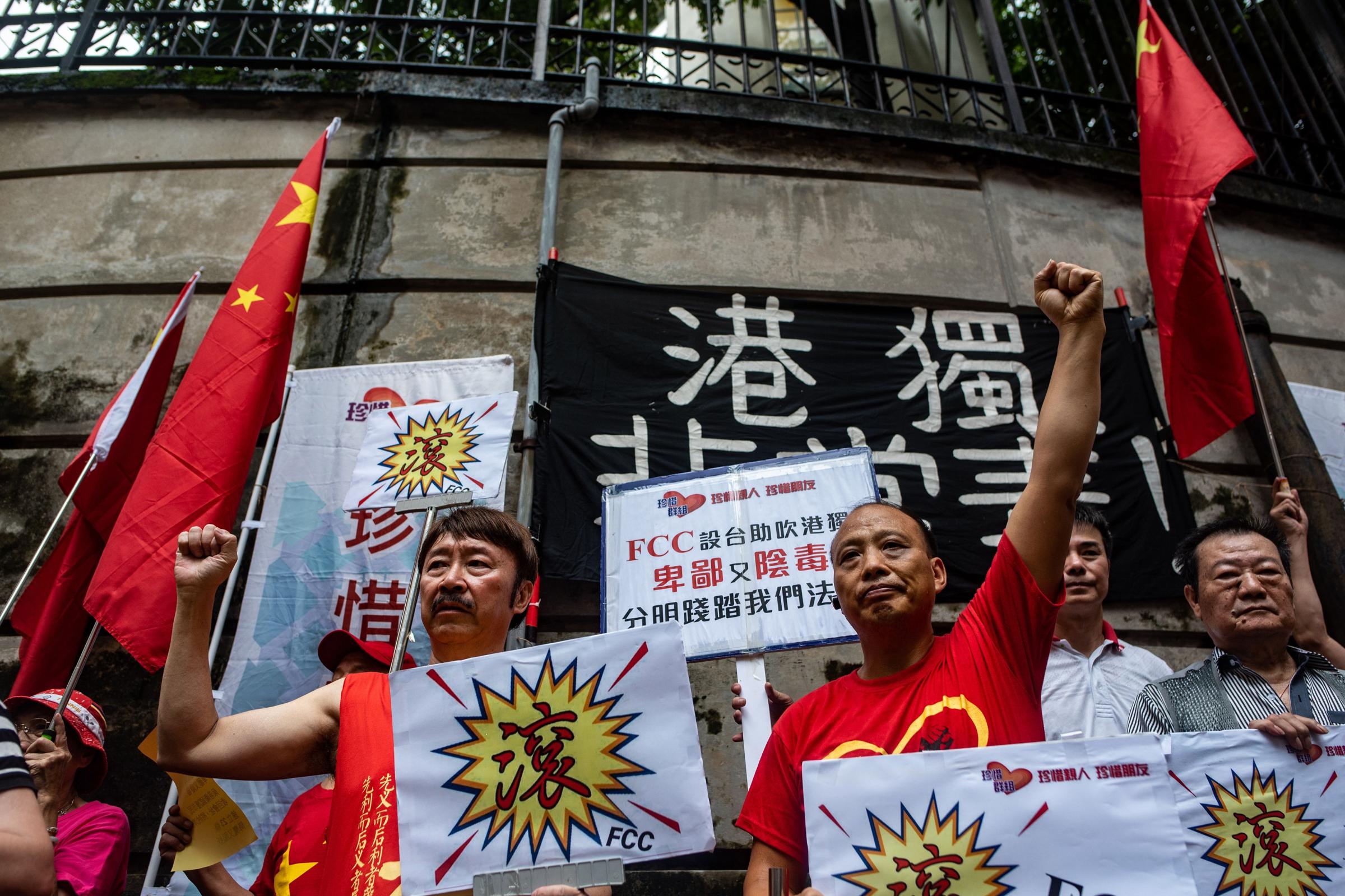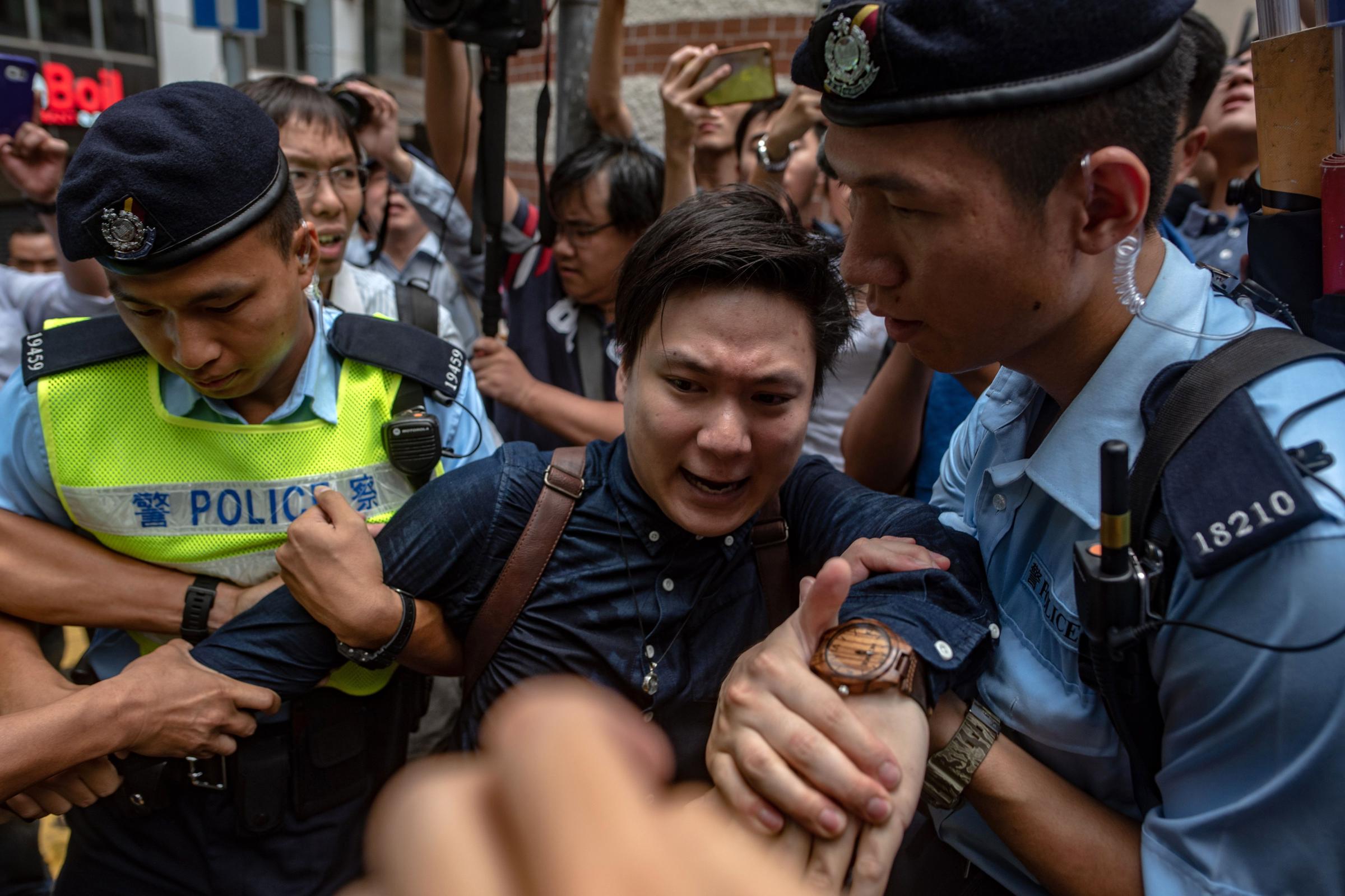In defiance of weeks of escalating government pressure, a Hong Kong independence activist delivered a highly anticipated address on Tuesday to a packed house of local and international media at the city’s Foreign Correspondents’ Club (FCC), calling for the city to breakaway from China but offering little in the way of a roadmap.
“If Hong Kong were to become truly democratic, Hong Kong sovereignty must rest with the people of Hong Kong. And there’s only one way to achieve this, independence,” said Andy Chan Ho-tin, the 27-year-old convener of the fledgling Hong Kong National Party (HKNP), which is currently facing the prospect of an unprecedented ban by the Hong Kong government on the basis that the group poses an “imminent threat” to national security.
As Chan spoke, loudspeakers blared slogans from the throngs of pro-China protesters crowding the pavements outside the club, who waved banners and Chinese flags.
Beijing has sternly indicated that it will not tolerate calls for independence from the former British colony, which is now a semi-autonomous region of China. In a speech delivered in city last year, President Xi Jinping warned, “Any attempt to endanger China’s sovereignty and security [or] challenge the power of the central government … is an act that crosses the red line, and is absolutely impermissible.”
When returned to China in 1997, the financial hub was guaranteed protection of its civil liberties and rule of law under a framework called ‘One Country, Two Systems.’ But the city’s autonomy has increasingly come under threat over the last few years, and Chan’s appearance at the FCC has given renewed focus to fears of deteriorating free speech in Hong Kong.

Following Tuesday’s luncheon, the Hong Kong government issued a statement saying that it “deeply regrets” the FCC’s decision to hold the event. “It is totally inappropriate and unacceptable for any person to openly promote and advocate the independence of Hong Kong,” a spokesman said. “As such, it is also totally inappropriate and unacceptable for any organization to provide a public platform to espouse such views.”
“We have continuously supported the FCC’s work over the decades,” the statement continued. “However, providing a public platform for a speaker to openly advocate independence completely disregards Hong Kong’s constitutional duty to uphold national sovereignty.”
Read More: China Is Trying to Block a Pro-Independence Activist From Speaking in Hong Kong
China’s Foreign Affairs Ministry also issued a statement denouncing the FCC for providing a platform to “poison the minds of the people,” calling it a “blatant interference with the rule of law” that “hurt the feelings of the Chinese people.”
“Journalists must have professional ethics and cannot use the guise of freedom of the press and speech to do dirty business that harms the sovereign security of other countries.” it added. “This is hypocrisy and self-deception.”
Earlier this month, Beijing sent a representative from the Ministry of Affairs to the FCC to urge the club to “reconsider its decision” to host Chan. The FCC, a bastion of free speech in Asia, rebuffed Beijing’s suggestion and stood by its decision to let Chan speak.
“These events are really at the core of the FCC,” said first vice president Victor Mallet in the luncheon’s opening remarks. “The fact that this lunch now seems to have become far from normal and has generated such exceptional interest in Hong Kong, and around the world, I think tells us more about the political climate in Hong Kong and in Beijing than it does about the FCC.”
“Hosting such event does not mean that we at the FCC either endorse or oppose the views of our speakers,” Mallet added. “Where we do take stand is on the issue of free speech in Hong Kong in Asia and the world. And the FCC does believe that its members, and the public at large, have the right, and in the case of correspondents and journalists, we have the professional responsibility, to hear the views of different sides in any debate.”

Over the recent days, the FCC has drawn the ire of pro-Beijing loyalists in Hong Kong, who have not been shy about voicing their dismay. In a series of nine Facebook posts, Hong Kong’s former leader Leung Chun-ying appeared to threaten the club by questioning the terms of its lease, erroneously stating that its historic premises in downtown Hong Kong were rented at a “token price.” Francis Moriarty, a former FCC board member, said in a Facebook post that on his departure from the board three years ago that the club was paying about $77,000 monthly in rent—a market rate.
In his address, Chan said that Hong Kong faced “cleansing” from an imperial China and that “Peking is now our colonial master,” using the archaic name of Beijing. “Time and time again, our government has shown whatever freedom or democracy they claim to be upholding are just communist mirages,” Chan said.
However, he was unable to offer specifics. He declined to give membership party figures or describe the economic basis on which an independent Hong Kong would exist. One member of the audience asked how long Chan planned to carry on “this charade.”
Originally a youth group called “Common Sense,” named after Thomas Paine’s eponymous leaflet that galvanized the American public to revolt against the British in the 18th century, the HKNP is a fringe party founded by Chan in March 2016. With minimal activity and no elected lawmakers, it carries minimal influence. During the 2016 legislative elections, Chan, and four other aspirants, were disqualified from running.
Chan earlier told TIME that efforts to block his speech at the FCC amounted to an attempt by China to “colonize Hong Kong,” adding, “[The Chinese government is] restraining journalists from reporting news to the international society just like how they do it in China.”
Independence in Hong Kong enjoys little support. According to one survey, 11.4% of Hong Kongers were in favor of independence, a 6% drop from the previous year
In July, Hong Kong authorities presented Chan with a dossier containing hundreds of pages of surveillance collected over the past two years and gave him until September to respond with reasons why his party should not be banned.
—With video by Abhishyant Kidangoor/Hong Kong
More Must-Reads from TIME
- Caitlin Clark Is TIME's 2024 Athlete of the Year
- Where Trump 2.0 Will Differ From 1.0
- Is Intermittent Fasting Good or Bad for You?
- The 100 Must-Read Books of 2024
- Column: If Optimism Feels Ridiculous Now, Try Hope
- The Future of Climate Action Is Trade Policy
- FX’s Say Nothing Is the Must-Watch Political Thriller of 2024
- Merle Bombardieri Is Helping People Make the Baby Decision
Contact us at letters@time.com